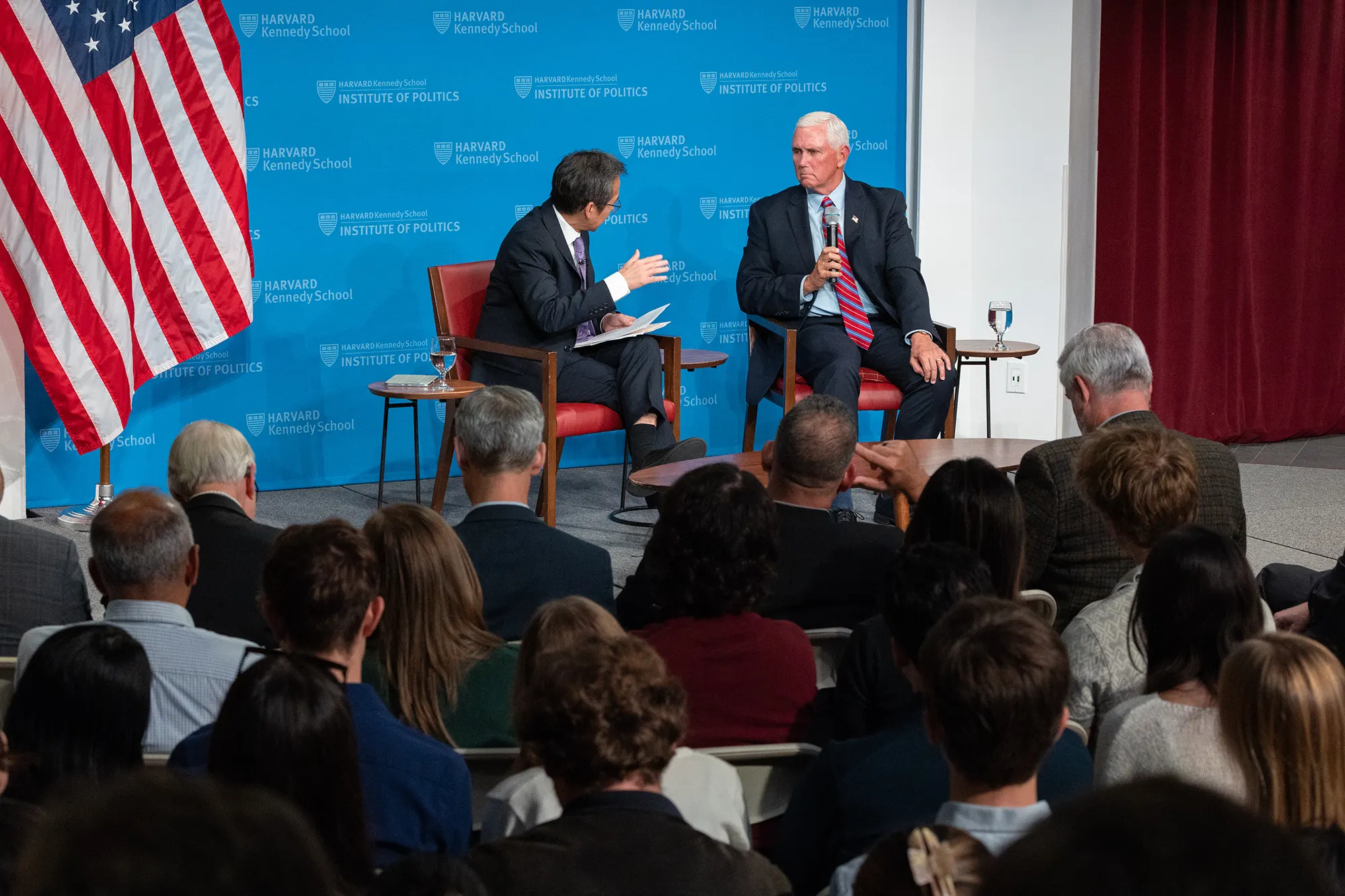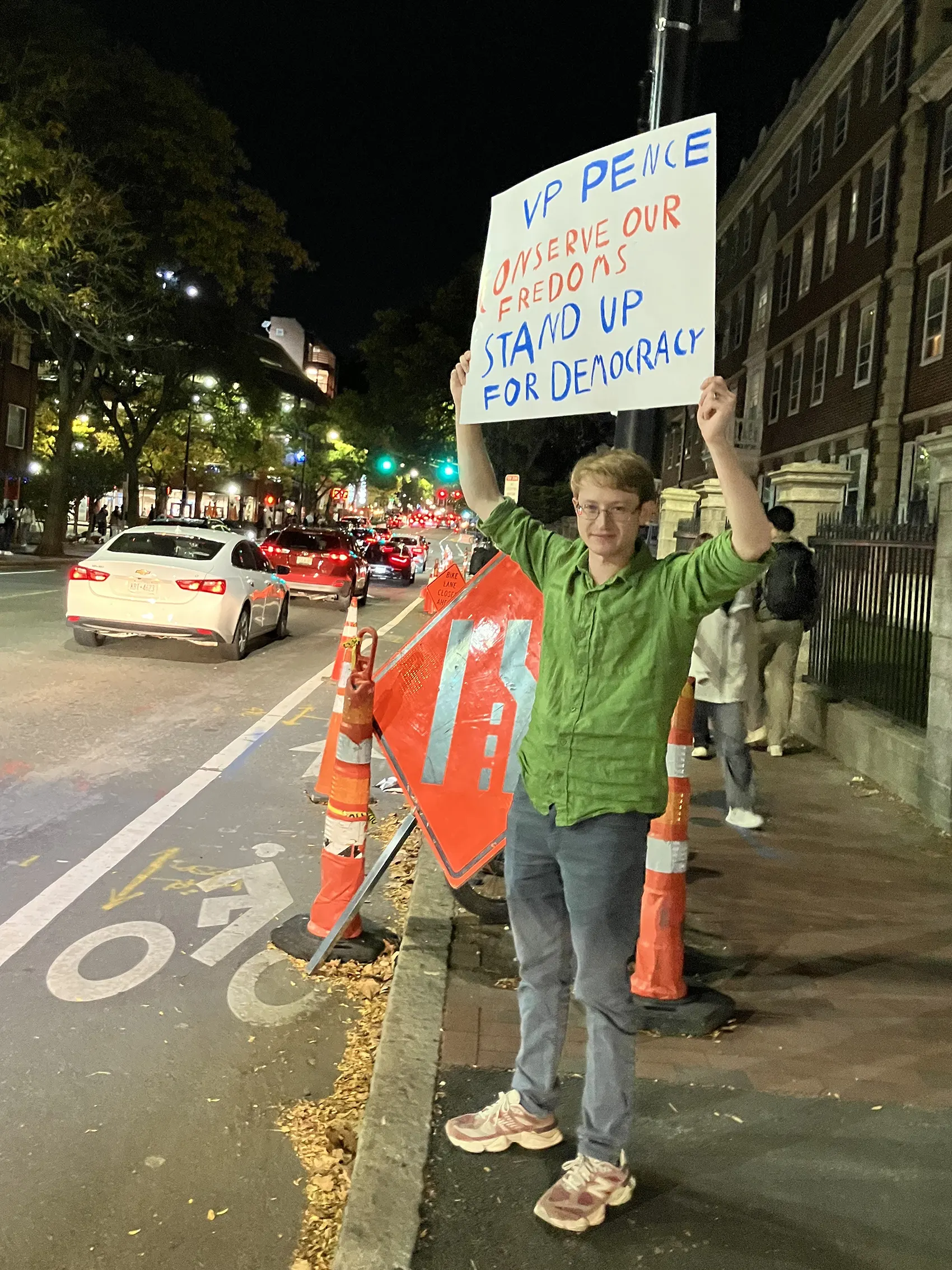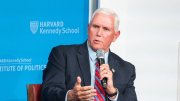Calling research universities “an enormously important part of our national life,” former Vice President Mike Pence expressed both support for and criticism of Harvard during a packed talk Tuesday evening at the Harvard Kennedy School (HKS).
During an audience Q&A, a College student asked Pence to comment on news that had just broken about a possible agreement between the University and the Trump administration. “I am hopeful that issues have been resolved,” Pence said, adding that he had “welcomed the administration’s efforts” to call out antisemitism at Harvard and other universities. “There can be no tolerance in America for antisemitism on our campuses or in our public squares,” Pence said. “And I appreciate the fact that Harvard conceded that there was an issue they had to deal with.”
At the same time, he added, the United States relies on its universities. “My hope is that there can be substantive and principled agreement reached so that we can move forward with the kind of support that will continue to underwrite the vital work of research universities around the world, around this country.”

The hourlong discussion, moderated by McCormack professor of citizenship and self-government Archon Fung, drew an audience of hundreds. Answering questions about the state of the nation, the former vice president advocated a return to Reagan-era Republican politics and the “heavy doses of civility” he sees as needed to bolster democracy.
Separating himself sharply from the president he once served, Pence called for an end to the White House’s across-the-board trade protectionism and argued for an expansive American role in geopolitics. “Something I learned traveling the globe as vice president was that if America is not leading the free world, the free world is not being led,” he said. “There is no B team.”
In particular, Pence emphasized the need to help Ukraine in the war against Russia, an issue that has divided Republicans and about which Trump himself has changed positions. “In my judgment, Vladimir Putin will not stop until he’s stopped,” Pence said, to applause from the audience.
The former vice president’s appearance at HKS came the day after a talk by another ally-turned-critic of Trump’s, former national security adviser John Bolton. On Monday, just weeks after the FBI searched Bolton’s home and office as part of a criminal investigation sparked by a scathing 2024 memoir about his time in Trump’s first administration, Bolton told the HKS audience that “Trump is an aberration in American politics” and that the administration is “all about Donald Trump and his neuron flashes on a day-by-day basis.”
Less combative than his former colleague, Pence sounded remarkably sanguine about the future of conservatism and the resilience of American institutions. When Fung asked Pence to “talk [him] down” about the potential collapse of free and fair elections in the face of a sustained Trumpian assault on democracy, Pence obliged. “I know the people of this country love our Constitution,” he said. “I know they will hold elected officials at every level to that standard in the days ahead, and that's where my confidence comes from.”
Meanwhile, Pence asserted, Trump and his political allies have “changed the agenda of the Republican Party, but I don’t think they’ve changed the Republican Party.” Citing conversations with American voters during his recent travels around the country, he said he believes most Republicans still hold the “common-sense, traditional values” popularized by President Ronald Reagan in the 1980s, and that a future presidential nominee “will be in a position to lead our party back to that foundation.”
But his warnings about political violence were starker. A student at Harvard Business School, who said that as the child of Lebanese immigrants he’d “seen personally how sectarian politics can ruin a nation,” asked about polarization and political vitriol. Pence responded that he was “heartsick” about the assassination of right-wing activist and organizer Charlie Kirk and, in a striking remark, seemed to call for Kirk’s killer, once convicted, to be put to death: “Justice delayed is justice denied ... I hope that the person that pulled the trigger and assassinated Charlie Kirk meets justice in months or a few short years and is not languishing in a prison 25 years from now.”
Pence also condemned last year’s assassination attempts against Trump and two recent attacks on Democratic politicians: an arson attempt earlier this year at Pennsylvania Governor Josh Shapiro’s home and the June murder of Minnesota lawmaker Melissa Hortman M.C.-M.P.A. ’18—an act, he said, of “unspeakable violence.” Describing his long friendship with the late Georgia congressman and civil rights icon John Lewis, Pence called for politicians and ordinary Americans alike to “disagree without being disagreeable.” “Being in public life,” he said, “has public responsibilities.”

After the talk ended, as the audience streamed out of the building, a solitary protester—first-year HKS student Neil Miller, who said he didn’t think Pence’s critiques of Trump’s threats to democracy had gone far enough—stood on the other side of JFK Street, holding a handmade sign. “VP Pence,” it read, “conserve our freedoms. Stand up for democracy.”









